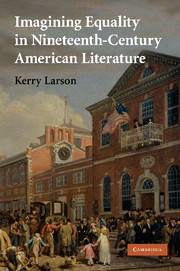1 - Indestructible equality
Published online by Cambridge University Press: 04 May 2010
Summary
THE DEFENSELESS ENEMY
In Harriet Beecher Stowe's anti-slavery epic, Uncle Tom's Cabin, it is easy to find examples of people who support slavery but hard to find examples of people who actually believe in it. Mr. Shelby may tell himself that it's his “right” (169; his emphasis) as a Southern gentleman to buy and sell his own “property” as he pleases, but on the day Tom is handed over to the slave-trader Haley he is so ashamed he can't bear to be present on his own farm to witness the event. Haley, who is no gentleman, may boast about the “humane” treatment of his “cargo,” but no amount of self-serving lies, it seems, can subdue an “uneasy conscience” (203). The same self-disgust is even more pronounced in the cases of St. Clare and Legree, two slaveholders haunted, respectively, by “a sort of chronic remorse” (306) and “slumbering moral elements” (567). Then, too, when the factory owner Mr. Wilson tries to persuade the runaway George Harris to give himself up on the grounds that slavery is sanctioned by the Bible (“we must all submit to the indications of Providence, George” [184]) and when George responds with a fiery speech on freedom and equality, Wilson almost instantly goes from urging George back to slavery to urging him onward to Canada. Likewise, Senator Bird may think that he is prepared to defend slavery's right to exist in the halls of Congress, but when confronted by a runaway slave at home his political scruples literally go out the door.
- Type
- Chapter
- Information
- Publisher: Cambridge University PressPrint publication year: 2008



